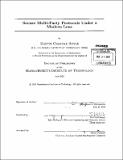Secure multi-party protocols under a modern lens
Author(s)
Boyle, Elette Chantae
DownloadFull printable version (16.27Mb)
Other Contributors
Massachusetts Institute of Technology. Department of Mathematics.
Advisor
Shafi Goldwasser.
Terms of use
Metadata
Show full item recordAbstract
A secure multi-party computation (MPC) protocol for computing a function f allows a group of parties to jointly evaluate f over their private inputs, such that a computationally bounded adversary who corrupts a subset of the parties can not learn anything beyond the inputs of the corrupted parties and the output of the function f. General MPC completeness theorems in the 1980s showed that every efficiently computable function can be evaluated securely in this fashion [Yao86, GMW87, CCD87, BGW88] using the existence of cryptography. In the following decades, progress has been made toward making MPC protocols efficient enough to be deployed in real-world applications. However, recent technological developments have brought with them a slew of new challenges, from new security threats to a question of whether protocols can scale up with the demand of distributed computations on massive data. Before one can make effective use of MPC, these challenges must be addressed. In this thesis, we focus on two lines of research toward this goal: " Protocols resilient to side-channel attacks. We consider a strengthened adversarial model where, in addition to corrupting a subset of parties, the adversary may leak partial information on the secret states of honest parties during the protocol. In presence of such adversary, we first focus on preserving the correctness guarantees of MPC computations. We then proceed to address security guarantees, using cryptography. We provide two results: an MPC protocol whose security provably "degrades gracefully" with the amount of leakage information obtained by the adversary, and a second protocol which provides complete security assuming a (necessary) one-time preprocessing phase during which leakage cannot occur. * Protocols with scalable communication requirements. We devise MPC protocols with communication locality: namely, each party only needs to communicate with a small (polylog) number of dynamically chosen parties. Our techniques use digital signatures and extend particularly well to the case when the function f is a sublinear algorithm whose execution depends on o(n) of the n parties' inputs.
Description
Thesis (Ph. D.)--Massachusetts Institute of Technology, Dept. of Mathematics, 2013. Cataloged from PDF version of thesis. Includes bibliographical references (p. 263-272).
Date issued
2013Department
Massachusetts Institute of Technology. Department of MathematicsPublisher
Massachusetts Institute of Technology
Keywords
Mathematics.